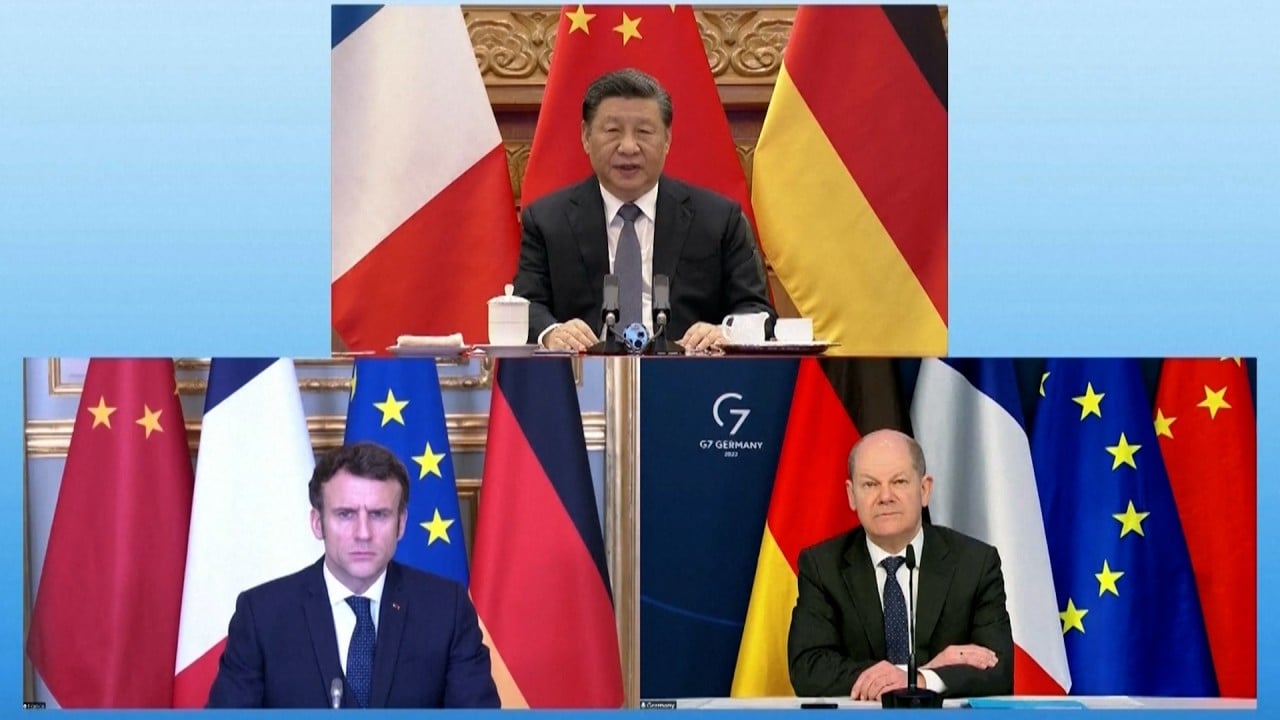
01:10
Sanctions on Russia will dampen global economy, Xi tells French and German leaders

It has been a tumultuous six months for Eurasia. The Taliban takeover in Afghanistan last August was followed by widespread civil unrest in Kazakhstan at the turn of the year and now a Russian invasion of Ukraine.
While Russia has had a prominent role in each context, it is China’s perspective that people most frequently ask about. Yet Beijing has stayed broadly passive, highlighting the role that China sees for itself in the world.
China may be the new superpower on the international stage, but it appears to have little interest in committing itself to resolving any problems that emerge in its neighbourhood or beyond.
The attention on China can sometimes seem exaggerated. We look for Beijing’s view on everything nowadays, sometimes where it is unlikely to be relevant. Yet the truth is that Beijing is a significant actor in all three Eurasian contexts.
China remains the putative largest single external investor in Afghanistan, is Kazakhstan’s second-largest trading partner (and fastest-growing investor), and since 2019 has been Ukraine’s largest trading partner.
China has undertaken or signed contracts for large-scale investments in all three countries, is an important trading partner and (in Afghanistan and Kazakhstan) has a particular interest given the shared borders.
So it is not entirely surprising that people look for China’s views in these contexts, and expect Beijing to want to step in when things turn bad. Yet, in each situation, China has instead stood by to let others try to fix the problems.
A similar playbook can be observed in all three cases. In the first instance, Beijing apportions blame – often finding the United States culpable for the situation.
In Afghanistan, the American withdrawal precipitated the Taliban takeover, making it an easy connection. In Kazakhstan, mutterings of “colour revolutions” started in Moscow and Nur-Sultan, giving Beijing ample fuel to point towards the US. And in Ukraine, China has continued to point to US-driven Nato expansion as a key underlying reason for the conflict.
Having blamed the US, the next step is to try to embrace tightly. In Afghanistan, this has led to a surge in Chinese activity on the ground, regular aid, close engagement with the Taliban authorities, regular championing of their interests at the United Nations and the constant promise (that has yet to materialise) of larger-scale investment.
In Kazakhstan, Beijing picked up seamlessly from where it left off before the trouble in January, while in Ukraine it is trying to sell itself as an impartial supporter of both sides.
Yet in all of this, Beijing commits very little. The constant presentation of multiple-point plans to resolve situations are largely empty declarations which appear well meaning but are not followed by any real evidence of effort to resolve the situations. Instead, they largely state the obvious and seem to suggest that Beijing is somewhat above the situation as a benign observer.
There is no doubt some element of Beijing’s stasis is not really knowing what to do. China’s offers to act as a peace broker have tended to be hollow, usually offering a table around which the various parties can sit.
While this is a useful role, a proper negotiator will need to work the various groups, understand their interests and force heads together. This is also likely to mean telling people what they do not want to hear, something Beijing is never very interested in doing as it potentially creates adversaries.
But so far, by sitting and watching, Beijing has not done itself much ill. While its international standing may be damaged among those who would like to see it take a more active role, by not doing so, China is leaving itself in a position where it can continue its relations with whichever party comes out on top.
And given Beijing’s strong economic interests in every situation, all the parties involved will usually have a strong incentive to continue to engage with Beijing after the chaos subsides.
But there is a longer-term problem here, which may eventually cause China some regret. The result of this passivity has been a Eurasia increasingly in tumult.
As Washington leads the West in a mostly seaborne crusade in the Indo-Pacific against China, we see the Eurasian heartland fall prey to three forces. Authoritarian incompetence, Russian adventurism and Chinese passivity. The result has been large-scale loss of life, and growing constraints on people’s liberties.
This is the net result of a Eurasian heartland abandoned to local forces, and increasingly overseen by superpowers who see value only in shaping history when they deem it important to their grandeur, and otherwise seem content to simply let things play out, no matter the consequences on the ground.
For now, China might be happy to watch things play out. But, unfettered, these forces are likely to create nothing but misery and a Eurasian backyard in which China will find itself the dominant power watching over chaos.
And while in the short term it might be possible to find some benefit from this situation, in the longer term, it will spill over and ultimately create problems that Beijing cannot just watch from the sidelines.
Raffaello Pantucci is senior associate fellow at the Royal United Services Institute (RUSI) in London